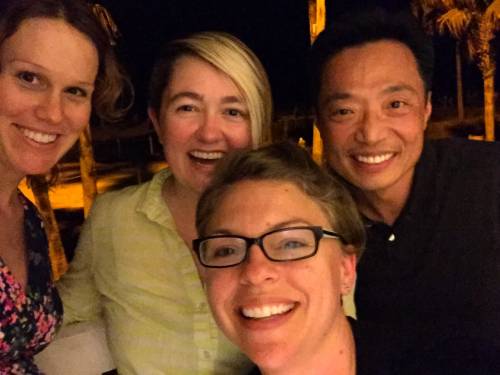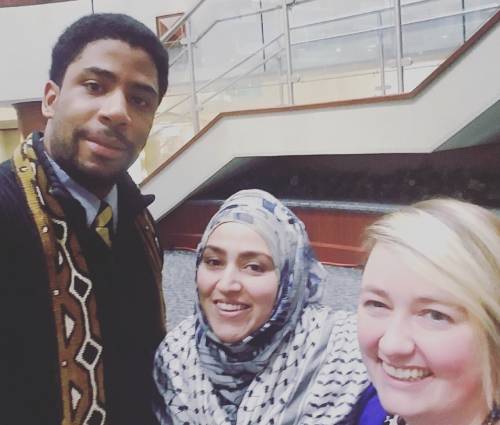Why go it alone?
Worship is not about the selfie
By Abby King-Kaiser

Revs. Sara Hayden, Abby King-Kaiser, InHo Kim (back) and Katy Steinberg (front) find joy in planning worship together for the 1001 New Worshiping Communities national gathering.
When I was starting my first full time pastoring gig, I could not wait to work WITH people and plan worship.
I could not have been more wrong about what planning worship would be like as a solo pastor, with emphasis on the word solo. I’m sure my experience isn’t universal, but I suspect it’s common. When it came to worship planning, I was on my own.
Here and there, there were the glimpses of collaboration I longed for — a retired educator in our congregation willing to give me extensive notes on my sermon, after I asked; a new musician who sought to help me integrate the theology of the service throughout the music; liturgists who understood it as a holy role.
But, I missed that team feeling of planning and executing on something together. I loved doing tech for high school theater because we made something — together. The church I interned for generated ideas for worship and preached series — together. As a solo pastor I missed that feeling of getting to lean back and savor a job well done — together. So much of what drew me to ministry was the opportunity to build community, so much of what kept me in the Presbyterian church were our theologies and polity related to how God works in community. Why was I suddenly start forging through worship planning largely on my own?
My current call as a college chaplain is so different than being a solo pastor, that I rarely compare the two. But recently I had to opportunity to work on worship leadership with a team for the 1001 New Worshipping Communities national gathering. We spent hours working through Scriptures, hashing out ideas, telling stories, laughing, editing ideas, it was glorious.
Right after I returned home, I spent a couple hours planning an interfaith prayer service with two colleagues (a Muslim chaplain and a Baptist pastor) only to find the same glorious experience. Why, oh why, did I ever do this alone?

Rev. Abby King-Kaiser regularly plans events with Rev. Nelson Pierce, Jr. and Tala Ali as an interfaith chaplain.
Let’s be real, planning worship with others is a big investment of time and is not the quick way to get things done. So given real parameters, how can we change our planning practices to feel more alive? Here is a quick, short list of practices. This by no means an original list, nor a comprehensive one. But many of suggestions are things we forget or drop in an effort to get through our to-do list each week:
Find a group to read the Scripture (you will preach on) with. Some towns or presbyteries have a clergy lectionary reading group. Other congregations read the Scripture the week before worship in a small group, giving the pastor a place to work out ideas for preaching. Look around and don’t have a group around? Make one. Chances are, at least one other pastor or pastor type around is feeling the same as you.
Or maybe there is a retired pastor nearby who misses the rhythm of the lectionary. Or just someone who geeks out on Scripture. Bust out a dry-erase board, or post-its and just generate idea after idea after idea for where a sermon could go, before you pick one. Do the same with a liturgical season. Buy pastries, make tea, get them together.
Ask for constructive feedback from a person you trust. I was an art major in undergrad, and much of our learning came from critiques by peers. This only worked because we had a solid community and trusted each other. Don’t just ask anybody to give you notes, maybe even invite an outsider, but be sure it is someone you trust, someone whose opinion you respect. Otherwise… it will feel like someone is bashing your preaching. Not helpful.
Go outside the congregation AND the church. Read the newspaper to see what the world is talking about, or a list of best recent non-fiction and pick something to read that will take you to the leading edges of thought and outside your comfort zone. How might these voices impact what you address in worship?
- Look for a design professional you don’t know well and ask their opinion on something to shift in your worship space.
- Go to a local art gallery and mine it for images that might impact your reading or expression of Scripture.
- Then, look for (maybe hire?) a local artist to interpret Scripture for a season or series.
- Go to a bar, a library, a zoo, a playground, a community event, just to overhear conversations.
- Much of my most “successful” artistic collaborations have been with a silent partner—illustrating a centuries old poem, working in a particular style that is not my own, reacting to something I read. The voices are there. Listen to them. Use them.
Buy someone coffee. Seriously, people love free. Really. And, be up front that it is not totally free. Pick their brain about what they are passionate about. And find ways for that to influence your planning or preaching. Maybe it is asking Catholic friend about the power of prayer in their lives. Maybe it is asking another mom in the PTA how they find Sabbath and listening as they describe how hard it can be. Maybe it is asking a youth in your church where God is in their life, and where God feels absent. Recently, a student I worked with had to do a Scripture assignment about the Lord’s prayer, so she interviewed a couple of friends about it. Do we do that? We can. Ask the right questions, be prepared to deeply listen to what is said without judgment… and buy the coffee.
Don’t forget the power of invitation. I often forget my own power. Because I hate feeling like a gatekeeper, I forget that I am a gatekeeper to worship in many ways. Which means… an invitation is powerful. I underutilize this. Invite someone on the fringe to step up their leadership. Make an open-ended invitation to a creative person to add their touch to worship, once or for a season—and then support what they come up with. Want more young folks in worship? Don’t forget to invite the ones you have lead in worship. And then ask for their thoughts and feedback, and care about what they say. Invite, invite, invite… and while you are at that…
Share. Does your preaching feel stale? Share the pulpit, maybe even with a ruling elder. Work with them on a sermon, watch for what you learn in the process, and challenge yourself to grow your own practice from working with them on their sermon. Do you always put together the bulletin and dread it each week? Invite someone else to do it, but don’t micro-manage. Share the power and influence over the way worship is presented. Have a deeply compassionate person who is great with words? Invite them to pray. There are few places in our worship that HAVE to be a teaching elder, the rest can be shared in a way that is so consistent with our Presbyterian way of being. This is hard in a culture of efficiency and individuality where it is almost always easier to do it yourself. But it will be less fun. It will be less dynamic, and it is less likely that you notice God surprising you.
The real challenge here is letting others meaningfully influence worship. People love to help. People do not love to help when they feel they make no difference. And some people just want to do it their way. But, there are people around you who would jump at the chance to help you accomplish where God is calling you in worship… together. Find them. Feed them. Be fed by them.
 Abby King-Kaiser is the assistant director for Ecumenical and Multifaith Ministry at the Dorothy Day Center for Faith and Justice at Xavier University. She returned to her hometown of Cincinnati, Ohio, for this call after a long sojourn in the San Francisco Bay Area. She is a coffee snob, occasional painter, and obsessive, though amateur, Instagrammer (@revabbykk).
Abby King-Kaiser is the assistant director for Ecumenical and Multifaith Ministry at the Dorothy Day Center for Faith and Justice at Xavier University. She returned to her hometown of Cincinnati, Ohio, for this call after a long sojourn in the San Francisco Bay Area. She is a coffee snob, occasional painter, and obsessive, though amateur, Instagrammer (@revabbykk).